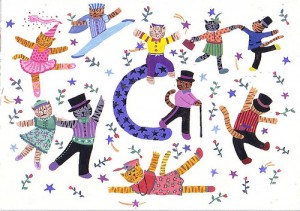
Elise was a dancer, a twirler, a self-motivated mover. Even as a baby she never sat still, and her mom fondly recalls how her feet fascinated her. The possibilities of human movement excited her. She hated all of science until Anatomy and Physiology, which taught her to think of every new way she could orchestrate her muscles and orient her bones.
Fortunately, her fascination received benign neglect from the Masters, who decide which children are trouble makers and which must be left to blossom. The troublemakers have their motions severely restricted, via a combination of surgical and chemical nerve overrides. Elise thought that to be one of the Restricted would be horrible, that she would die if she couldn’t dance as she wanted. Her friend Hector said it’s not so bad, he can still think whatever he wants and write whatever he wants so he has his free speech rights. Just can’t punch things, can’t pull triggers, that sort of thing. She felt bad for Hector but didn’t want him to feel her pity, so she didn’t talk about it with him
But she was nearing the end of high school, and she needed to do a senior project. What better to do than to override the possibilities of the Restricted? Her brother James pointed out, rightly, that those she wanted to reach would never attend a recital in the fancy hall where she took lessons. No, her project must be in the street.
She elected to stage a morning happening, on the sidewalk where she turned to go to school. She also elected a schoolgirl costume, a plaid skirt, a white collared shirt, to emphasize her audience. James warned her that she might have no audience as a school girl where school girls usually walked. She frowned, then agreed. “Let’s make an audience, then, you and me. We’ll print some people out on cardboard posters and stand them around. Cardboard People! That’s the name of the program.”
It stuck. They created seven or eight life-size cutouts of a fake audience, both to emphasize the theme of the show, and also to draw attention to the fact of the performance.
She asked Hector to come to the show, and to bring his friends. Her faculty sponsor and family invited, all that remained was to design her dance.
The morning of her show dawned. She and James carted the beginning audience to the chosen site quite early, before the main traffic began; still, they attracted a lot of attention, and with the help of the simulated audience she drew quite a large group. A discreet music player hid between the cutouts, and suddenly blasted hip-hop into the morning air.
The dance began with trigger pulls and punches, with violence, with Elise miming every way a human figure could enact violence. Her actions split the air but managed to communicate vivacity and passion. People in the audience unconsciously began to move along with her, and James noticed many who tried but could not follow her.
But the music changed, and so did her dance. And the results of Elise’s careful preparation became clear: she danced in ways that all could do, stopping meticulously to mime a nervous boundary, to skirt around the edges of the Restricted capabilities. And all the people saw, and all the people could move along with her, Restricted and free alike, and there was a dancing mob that morning on the corner of 9th and Locust, before the Masters could shut it down.
When the sirens began, Elise realized she had provoked more of a reaction than she expected, and she was about to join the ranks of Restriction. But she realized as well that no matter what they did to her, no matter which pathways they blocked, she would find a way around it, she would scuttle over barricades and burrow under walls. They could not stop her dance, and she did not fear the punishment that was to come.




